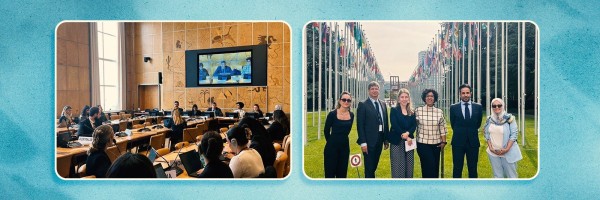On 16 September 2025, during the 60th Session of the UN Human Rights Council, ALQST, in collaboration with the Gulf Centre for Human Rights and MENA Rights Group, delivered two joint oral statements highlighting urgent human rights concerns in Saudi Arabia.
The first statement highlighted the ongoing and systematic practice of arbitrary detention in Saudi Arabia, referencing 33 Opinions issued by the UN Working Group on Arbitrary Detention—of which only five individuals have been released. It also expressed deep concern over the continued use of the death penalty, including in cases involving child defendants.
The second statement addressed the rights of older persons in the Kingdom, following the UN Independent Expert’s visit in April. It expressed serious concern over the Saudi authorities’ refusal to grant her access to elderly individuals held in arbitrary detention.
Both statements can be read in full below.
Joint oral statement on arbitrary detentions:
Mr. President,
The Gulf Centre for Human Rights, MENA Rights Group, and ALQST for Human Rights wish to draw attention to the ongoing arbitrary detention of numerous individuals in Saudi Arabia, subjects of opinions issued by the Working Group on Arbitrary Detention.
Since 2016, the Working Group has issued 33 Opinions highlighting a systemic pattern of arbitrary detention in the country, which they have indicted could amount to a crime against humanity. Only 5 individuals have been released, often after serving lengthy prison sentences amounting to decades. Their releases remain conditional as they are subjected to arbitrary travel bans, surveillance and threats of re-arrest. Many others remain unjustly imprisoned solely for exercising their fundamental rights.
Meanwhile, amid an escalating execution crisis, several individuals, subject of past Opinions have since been executed, or are awaiting execution. Most recently, Saudi youth Jalal Labbad, was executed after having been convicted of crimes allegedly committed when he was a child. His execution raises grave fears for other child defendants at imminent risk of execution, such as Abdullah al Derazi, subject of Opinion No. 71/2024.
Given the urgency of cases involving individuals at risk of execution as well as the recent releases of several political prisoners, who nevertheless all remain under arbitrary travel bans and unable to resume their activism, we believe this is a critical moment for the Working Group to initiate a follow up procedure with the Saudi government to ensure the full and unconditional implementation of the Working Group’s Opinions and request the release of all arbitrarily detained individuals.
Joint oral statement on the human rights of older persons:
Mr. President,
The Gulf Centre for Human Rights and ALQST for Human Rights welcome the Independent Expert’s visit to Saudi Arabia in April. Such visits are essential, particularly given their rarity due to the Saudi authorities’ routine denial of access to independent observers.
As the Independent Expert has noted with regret, we strongly deplore the Saudi authorities’ refusal to grant her access to several older persons arbitrarily detained in Al-Ha’ir prison. This constitutes a serious breach of the visit’s terms of reference.
As a result, the visit to Al-Ha’ir prison offered only a carefully managed and partial view. While the report highlights the quality of some facilities, it fails to reflect the reality experienced by arbitrarily detained individuals—such as prominent preacher Salman al-Odah, 68 years old—who have endured severe mistreatment, including medical neglect.
Tragically, prominent human rights defender Dr. Abdullah al-Hamid died in custody at the age of 69, following repeated denials of necessary medical care.
We echo the Independent Expert’s concerns about the lack of transparency surrounding the number, health status, and legal grounds for the detention of older persons. As she rightly states, this opacity severely undermines accountability and independent monitoring efforts.
The independent expert further noted that most domestic care workers are bound by the kafalah system of sponsorship to their employer, which exposes them to a high risk of economic and physical abuse, trafficking and exploitation.
We urge the Saudi authorities to implement the Independent Expert’s recommendations in full, including reviewing the legality of all detentions involving older persons and immediately releasing those whose detention has been deemed arbitrary by the UN Working Group on Arbitrary Detention and to provide labour rights for all migrant workers.
Thank you.




